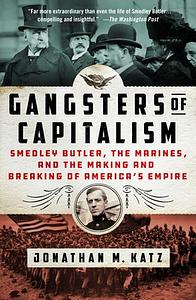You need to sign in or sign up before continuing.
Take a photo of a barcode or cover
118 reviews for:
Gangsters of Capitalism: Smedley Butler, the Marines, and the Making and Breaking of America's Empire
Jonathan M. Katz
118 reviews for:
Gangsters of Capitalism: Smedley Butler, the Marines, and the Making and Breaking of America's Empire
Jonathan M. Katz
emotional
informative
inspiring
reflective
sad
fast-paced
a must read. everything we are going thru we have done before
informative
reflective
fast-paced
Insightful and challenging review of the birth of US imperialism and its many echoes today as told through the fascinating life and career of one its enforcers. Can’t recommend it enough.
challenging
dark
hopeful
informative
medium-paced
informative
fast-paced
challenging
informative
reflective
medium-paced
adventurous
dark
informative
medium-paced
If you haven't read General Butler's polemic War is a Racket, you owe it yourself. Short, sharp, and incisive, Butler explains the reality of empire with the clarity of bloody hands. Katz's book is a valuable companion, explaining the context of Butler's life when the actions have slipped from current events to untaught history.
Smedley Butler was born in 1881 to a prosperous Quaker family in Philadelphia. As the Spanish-American war heat up, Butler spurned his pacifist upbringing and gave into the jingoism of the times, joining the Marines as an officer candidate. He missed major action in Cuba, but was soon thrown into the bloody invasion and occupation of the Philippines, a colonial war which saw the death of approximately a million Filipinos with brutal "anti-bandit" tactics. Butler rose rapidly through the ranks, a true Old Salt Marine with an unbreakable devotion to the Corps and his men. He saw action in China, Panama, Mexico, Honduras, Haiti, France (though not the Western Front command he craved), and China again, with a brief interlude as an ani-corrption police chief in Philadelphia.
As Butler himself would describe, his career was marked with heroism, including two Medals of Honor, but this heroism was carried out entirely in the service of American companies, including United Fruit, Standard Oil, and Morgan Stanley. American foreign policy involved manufacturing an incident, a cassus belli to send the Marines, using superior firepower to knock out local resistance, and then setting up a pro-American gendarmie, while maintaining American control over customs and key strategic resources. Haiti is perhaps the most demonstrative case, as Butler's Marines stole the national gold reserves in a bank heist, deposed Parliament when they balked at a new constitution which would permit foreigners to own land, and used forced corvee labor to expand the national road network.
On retirement, Butler became a staunch anti-militarist. In one of the odder moments, he alleged that a Business Plot, orchestrated by bond salesmen Gerald P. MacGuire and Grayson M–P Murphy, had approached him to lead an army of veterans in coup to overthrow FDR. There is little evidence for the Business Plot, aside from Butler's testimony, and the investigation at the time was certainly bungled. The outline is plausible, except it's unclear why anyone would pick Butler as their man on a white horse when Douglas MacArthur is right there. Butler spent the 30s campaigning against fascism, war and Wall Street, and passed away in 1940 of stomach cancer.
Katz mixes the history with a contemporary travelogue to the places Butler touched, looking at how American Empire is remembered by the descendents of those who experienced it. I'm mixed on the blend. We live in a world Butler warned us about, decades of anti-Communist containment blending easily into the War on Drugs and the War on Terror, a bloody empire where as Butler warned and Fanon described, the violence of the frontier has come home to the metropole. But Katz is much less engaging as a subject than Butler himself. Butler's 'small wars' are the direct ancestors of today's counter-terrorism and counter-insurgency tactics, and while anyone who's paying attention can see the parallels, I wish more words had been used in analysis than on tourism. Still, there might not be an easier way to demonstrate the blunt fact that America's Empire is not a matter of the past, an embarrassing colonial interlude by our great-great-grandparents, but a live and going concern.
Smedley Butler was born in 1881 to a prosperous Quaker family in Philadelphia. As the Spanish-American war heat up, Butler spurned his pacifist upbringing and gave into the jingoism of the times, joining the Marines as an officer candidate. He missed major action in Cuba, but was soon thrown into the bloody invasion and occupation of the Philippines, a colonial war which saw the death of approximately a million Filipinos with brutal "anti-bandit" tactics. Butler rose rapidly through the ranks, a true Old Salt Marine with an unbreakable devotion to the Corps and his men. He saw action in China, Panama, Mexico, Honduras, Haiti, France (though not the Western Front command he craved), and China again, with a brief interlude as an ani-corrption police chief in Philadelphia.
As Butler himself would describe, his career was marked with heroism, including two Medals of Honor, but this heroism was carried out entirely in the service of American companies, including United Fruit, Standard Oil, and Morgan Stanley. American foreign policy involved manufacturing an incident, a cassus belli to send the Marines, using superior firepower to knock out local resistance, and then setting up a pro-American gendarmie, while maintaining American control over customs and key strategic resources. Haiti is perhaps the most demonstrative case, as Butler's Marines stole the national gold reserves in a bank heist, deposed Parliament when they balked at a new constitution which would permit foreigners to own land, and used forced corvee labor to expand the national road network.
On retirement, Butler became a staunch anti-militarist. In one of the odder moments, he alleged that a Business Plot, orchestrated by bond salesmen Gerald P. MacGuire and Grayson M–P Murphy, had approached him to lead an army of veterans in coup to overthrow FDR. There is little evidence for the Business Plot, aside from Butler's testimony, and the investigation at the time was certainly bungled. The outline is plausible, except it's unclear why anyone would pick Butler as their man on a white horse when Douglas MacArthur is right there. Butler spent the 30s campaigning against fascism, war and Wall Street, and passed away in 1940 of stomach cancer.
Katz mixes the history with a contemporary travelogue to the places Butler touched, looking at how American Empire is remembered by the descendents of those who experienced it. I'm mixed on the blend. We live in a world Butler warned us about, decades of anti-Communist containment blending easily into the War on Drugs and the War on Terror, a bloody empire where as Butler warned and Fanon described, the violence of the frontier has come home to the metropole. But Katz is much less engaging as a subject than Butler himself. Butler's 'small wars' are the direct ancestors of today's counter-terrorism and counter-insurgency tactics, and while anyone who's paying attention can see the parallels, I wish more words had been used in analysis than on tourism. Still, there might not be an easier way to demonstrate the blunt fact that America's Empire is not a matter of the past, an embarrassing colonial interlude by our great-great-grandparents, but a live and going concern.
I learned a lot from this. I vaguely knew about the fact of a lot of American global crimes in this era, but this has a lot of great detail. Eerie how this guy was present for so much world-shaking stuff, and also funny how he seems to be one of the only ones in his cohort to become so fully disillusioned that he started speaking against it. And even then, if his political gambit had succeeded or he'd done well in business after his military days, would he still have spoken out?
adventurous
dark
informative
reflective
sad
medium-paced




